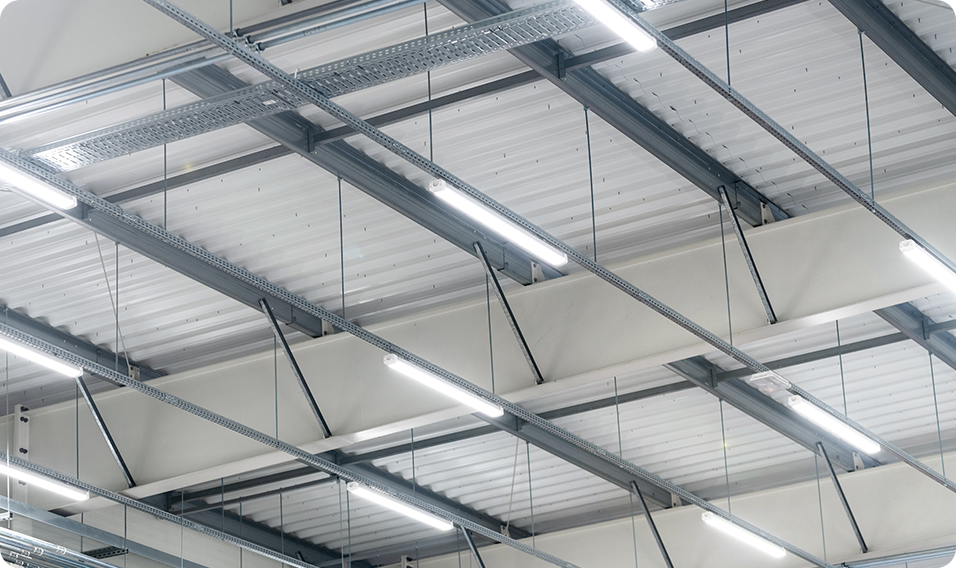Production
Green Initiatives
in Our Projector Business
Energy Conservation at Our Factories
Efficient Energy Management
Our commitment to energy conservation is founded on a strong determination to balance quality control and environmental protection. As part of our mission, the Panasonic Group has set a goal to achieve “net-zero CO2 emissions from all business operations by 2030.” In the projector business, we are undertaking various initiatives to achieve this goal, including waste reduction, material efficiency, and improving energy utilization rates. Here, we spotlight the manufacturing process of our projector business and introduce efforts within our factories and facilities.
Improved Cleanroom Efficiency
In projector manufacturing, even the slightest intrusion of fine dust into the optical block can potentially affect the image quality. We’ve taken steps to maintain product quality by eliminating contaminants from sterile production areas while decreasing energy usage at the same time. For instance, in the context of large-scale clean rooms, substantial resources were necessary for their operation and maintenance. As a result, we conducted a process review, leading to the downsizing of certain clean rooms and the transition of some processes to open clean benches. This change limits the controlled conditions to the immediate workspace, substantially reducing resource consumption without compromising product quality. Additionally, we've made investments in upgrading our equipment to enhance energy efficiency throughout our production lines, ensuring that every step aligns with our sustainability goals.
Smart Energy Practices, Including Factory LED Lighting

Our commitment to minimizing our carbon footprint extends beyond the workday. We've implemented energy-saving strategies during off-hours, including nights and holidays, to reduce energy wastage during periods of lower activity. Furthermore, the majority of our factories are lit by efficient LED lighting, and we've implemented air-conditioning management in our cleanrooms and beyond to minimize energy waste.
Waste Reduction and Recycling Programs
Recycling of Plastic Components
Our commitment to energy efficiency complements our efforts to reduce waste and enhance resource utilization throughout our production processes. In the molding of plastic components, no waste goes unnoticed. Excess materials (such as runners, which are produced during the molding of plastic parts) are reprocessed and given new life. These recycled materials find purpose in applications such as reusable containers, highlighting our dedication to maximizing the potential of every resource.
Smart Packaging to Reduce Waste
We’re making inroads into reducing packing waste by transporting components with returnable boxes. Other changes, such as switching to a thinner stretch film to enhance pallet stability during transportation, further underscores our sustainable practices.
Sustainability Efforts at Our Facilities
Use of Recycled Paper
We are conscious of the environmental impact of our daily business operations. In addition to reducing paper usage by digitizing internal documentation, marketing materials, manufacturing manuals, and so on, we use recycled paper and collect and recycle any paper waste.
Efficient LED Lighting
LED lighting strips consume less than half the electricity of linear fluorescent and CFL bulbs and don't contain hazardous substances such as mercury. They also last more than twice as long as alternative products, reducing wastage and maintenance. Panasonic has transitioned to efficient LED lighting across the majority of its manufacturing and non-manufacturing sites, a move that has made a significant contribution to our carbon-neutral ambitions.
ISO 14001-Certified Facilities
Driving Sustainability with EMS
Since fiscal 1999, the Panasonic Group has implemented Environmental Management Systems (EMS) across all its global manufacturing sites that are validated by ISO 14001 certification. This commitment extends to our projector business's manufacturing and development sites, which have also obtained ISO 14001 certification.
- Environmental Contribution
- Customer Workflow and
Social Contribution to the World



